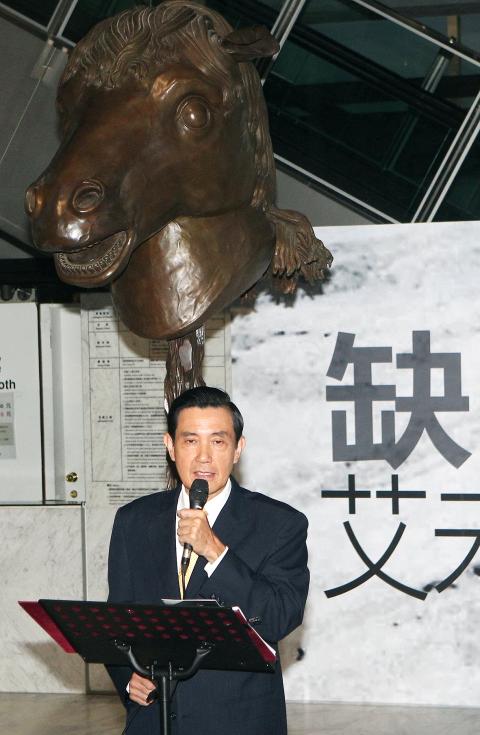President Ma Ying-jeou (馬英九) yesterday called for China to respect human rights and defended Chinese dissident artist Ai Weiwei’s (艾未未) right to freedom of expression as he attended an exhibition of Ai’s work at the Taipei Fine Arts Museum.
Dubbed “Ai Weiwei, Absent,” the exhibition features 21 of Ai’s works, including photographs, installation pieces, videos, 12 bronze heads representing Chinese zodiac symbols and a new piece consisting of about 1,000 bicycles.
Ma praised the diversity, deep emotions and reflections on Chinese society shown in Ai’s artwork and installation pieces, such as a surveillance monitor made of marble, a comment on Ai’s life under the Chinese government’s scrutiny, and said it highlighted the difference between Taiwan and China.

Photo: Hu Shun-hsiang, Taipei Times
“In Taipei, local borough chiefs and residents urged the city government to install surveillance monitors as a public safety measure. It is an interesting observation of how monitors here are rarely used as a tool for the violation of human rights,” he said.
Defending his efforts to press China on improving human rights, Ma said he urged the Chinese government to release Ai and Chinese dissident Liu Xiaobo (劉曉波) in his statement on the 22nd anniversary of China’s Tiananmen Square Massacre on June 4, urging China to respect human rights as a way to promote cross-strait relations.
“The distance between Taiwan and the Mainland depends on the two sides’ views on the protection of human rights. The more similarities we share on the issues of human rights, the closer that distance will become,” Ma said.
In a written statement this year marking the Tiananmen Square Massacre, Ma urged the Chinese authorities to release Liu, Ai and other Chinese dissidents, and called on China to “undertake political reforms and promote the development of freedom, democracy, human rights and the rule of law.”
Ai, an outspoken critic of the control the Chinese Communist Party exerts over Chinese society and censorship in the country, was imprisoned in April on his way to Beijing airport for a planned trip to Taiwan.
He was released in June after almost three months of detention that sparked outrage worldwide.
He is currently being investigated for tax evasion and has been prohibited from leaving the country.
Pan-green lawmakers have accused the Taipei City Government and the museum of failing to help Ai visit Taiwan and attend his own exhibition, which began on Oct. 29 and runs through Jan. 29.
Ma yesterday defended the city government, saying Taipei Mayor Hau Lung-bin (郝龍斌) had invited Ai to attend the opening of the exhibition and the city government has never had a problem with Ai visiting Taipei.
Accompanied by Taipei Department of Cultural Affairs Commissioner Cheng Mei-hua (鄭美華) and Taipei Secretariat Chen Yung-ren (陳永仁) at the exhibition, Ma spent about 15 minutes glancing over the works.
However, he passed over some of Ai’s well-known works, including Study of Perspective: Tiananmen Square, in which Ai gives the finger in front of the square.

Tropical Storm Gaemi strengthened into a typhoon at 2pm yesterday, and could make landfall in Yilan County tomorrow, the Central Weather Administration (CWA) said yesterday. The agency was scheduled to issue a sea warning at 11:30pm yesterday, and could issue a land warning later today. Gaemi was moving north-northwest at 4kph, carrying maximum sustained winds near its center of up to 118.8kph and gusts of 154.8kph. The circumference is forecast to reach eastern Taiwan tomorrow morning, with the center making landfall in Yilan County later that night before departing from the north coast, CWA weather forecaster Kuan Shin-ping (官欣平) said yesterday. Uncertainty remains and

SEA WARNING LIKELY: The storm, named Gaemi, could become a moderate typhoon on Wednesday or Thursday, with the Taipei City Government preparing for flooding A tropical depression east of the Philippines developed into a tropical storm named Gaemi at 2pm yesterday, and was moving toward eastern Taiwan, the Central Weather Administration (CWA) said. Gaemi could begin to affect Taiwan proper on Tuesday, lasting until Friday, and could develop into a moderate typhoon on Wednesday or Thursday, it said. A sea warning for Gaemi could be issued as early as Tuesday morning, it added. Gaemi, the third tropical storm in the Pacific Ocean this typhoon season, is projected to begin moving northwest today, and be closest to Taiwan on Wednesday or Thursday, the agency said. Today, there would likely

DISRUPTIONS: The high-speed rail is to operate as normal, while several airlines either canceled flights or announced early departures or late arrivals Schools and offices in 15 cities and counties are to be closed today due to Typhoon Gaemi, local governments announced last night. The 15 are: Taipei, New Taipei City, Taoyuan, Tainan, Keelung, Hsinchu and Kaohsiung, as well as Yilan, Hualien, Hsinchu, Miaoli, Chiayi, Pingtung, Penghu and Lienchiang counties. People should brace for torrential rainfall brought by the storm, with its center forecast to make landfall on the east coast between tonight and tomorrow morning, the Central Weather Administration (CWA) said. The agency issued a sea warning for the typhoon at 11:30pm on Monday, followed by a land warning at 11:30am yesterday. As of

CASUALTY: A 70-year-old woman was killed by a falling tree in Kaohsiung as the premier warned all government agencies to remain on high alert for the next 24 hours Schools and offices nationwide are to be closed for a second day today as Typhoon Gaemi crosses over the nation, bringing torrential rain and whipping winds. Gaemi was forecast to make landfall late last night. From Tuesday night, its outer band brought substantial rainfall and strong winds to the nation. As of 6:15pm last night, the typhoon’s center was 20km southeast of Hualien County, Central Weather Administration (CWA) data showed. It was moving at 19kph and had a radius of 250km. As of 3pm yesterday, one woman had died, while 58 people were injured, the Central Emergency Operation Center said. The 70-year-old